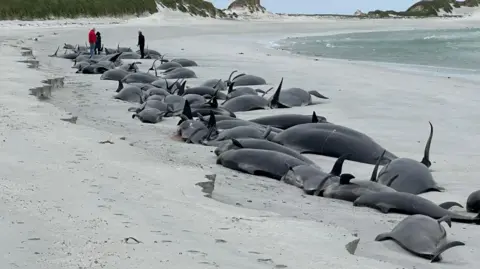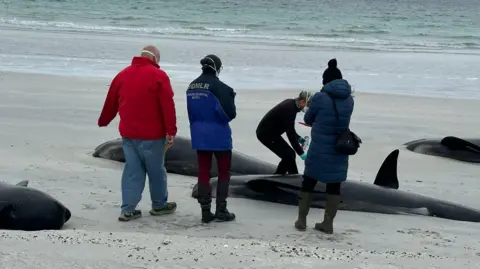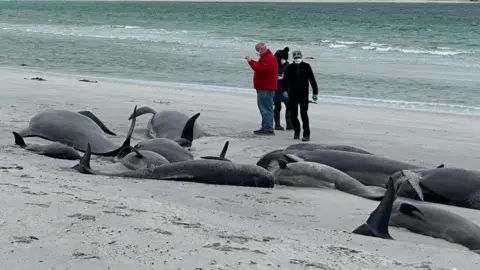By Megan Bonar & Rob Flett, BBC Scotland News
A pod of 77 pilot whales has washed ashore on a beach in Orkney in what could be the biggest mass strandings for decades.
The British Divers Marine Life Rescue (BDMLR) have established 12 of the animals at Tresness Beach on the island of Sanday are still alive – but it is unlikely they can be saved.
The pod includes male whales up to seven meters (22ft) long as well as females, calves and juveniles.
Experts say it is too early to know what has caused the stranding, but it is likely one of the whales got into trouble and the rest of the pod tried to help.
Members of the public are being asked to stay away from the area while assessments and rescue efforts take place.


Early indications suggest it could be the largest stranding event in Scotland since at least 1995, when the Scottish Marine Animal Stranding Scheme (SMASS) was founded – though strandings of a similar scale have been seen in recent years.
Last year an entire pod of 55 pilot whales died following a stranding on Lewis.
Only 15 of whales were alive when they were washed ashore. One was successfully re-floated while the rest had to be euthanised.
Between 60-70 of the animals came into shallow waters in Sutherland in 2011.
According to the Natural History Museum, the largest UK stranding took place in 1927 when 126 out of more than 130 false killer whales died in the Dornoch Firth in the Highlands.
Experts from the BDMLR, the Scottish SPCA and marine vets from the Scottish mainland are on their way to Sanday to do what they can for the whales.
The area is currently cut off by the high tide and the sand on the beach where they have stranded is proving too soft to allow the mammals to be righted.
The whales need to be moved back into an upright position as quickly as possible before there is any chance they can be re-floated. The soft sand means the whales are falling back over when the rescuers attempt to right them.


‘Hugely emotional’
Emma Neave-Webb from BDMLR said the latest stranding was a “big, big incident”.
She told BBC Scotland News: “There are whales everywhere. There’s a long line of them, some of them are still alive.
“I know from experience how difficult these incidents are and I think we need to be realistic.”
BDMLR medics are being brought in from mainland Orkney and Inverness to help with the rescue attempt, but Ms Neave-Webb said it is unlikely many will be saved.
“We will do our utmost best obviously but they have been here for quite some time so I think we have to be slightly pragmatic about it,” she said.
Ms Naeve-Webb described the scene on Tresness Beach as “really quite horrible” and “hugely emotional”.


Andrew Brownlow of the Scottish Marine Animal Stranding Scheme said mass strandings of this scale are becoming more common in Scotland.
He told BBC News: “It used to be quite unusual to have a mass stranding event, certainly of this size.
“But over the last ten years or so we have seen an increase both in the number of mass stranding events around Scotland and also the size of the mass and the number of animals that it involves.
“So that is slightly concerning and that might be because there are just more animals out there, or it could be that there are more hazards that these animals are exposed to.”








